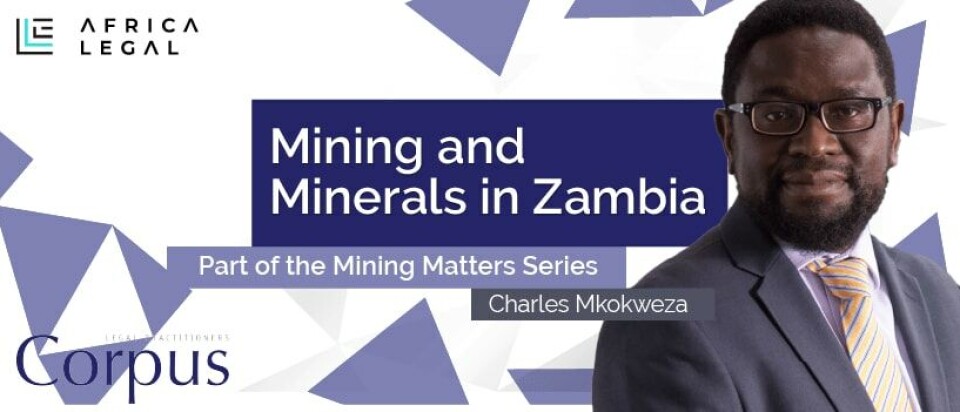Copyright : Re-publication of this article is authorised only in the following circumstances; the writer and Africa Legal are both recognised as the author and the website address www.africa-legal.com and original article link are back linked. Re-publication without both must be preauthorised by contacting editor@africa-legal.com
Mining central to Zambian Economy

With the Investing in African Mining Indaba underway in Cape Town from February 3 to 6, Charles Mkokweza, the senior partner in Zambian law firm Corpus looks at the industry in the southern African country.
In Zambia, mining is a crucial component of the overall economy. Since independence in 1964, the mining industry has provided the traditional base for foreign exchange earnings and continues to be the major contributor to export receipts, accounting for more than 70 percent of export earnings by 2017.
The mining sector and its supporting industries provide employment and the infrastructure backbone in areas that would otherwise lack the impetus for sustained development.
Historically, mining development has been concentrated in the Copperbelt Province, where mines are renowned for their high-grade deposits, and lately, the North-Western Province, although mining operations exist throughout the length of the country
Target minerals are mainly base metals, platinum group metals, uranium and gold. However, the Ministry of Mines, through the Mining Cadastre Office, has reported an increase in exploration applications for the mining of manganese, lead and zinc as well as cobalt, metals traditionally used for the development of battery technologies.
Zambia also hosts small-scale gold, and manganese deposits. In recent years, exploration has significantly expanded, throughout Zambia, to include prospecting for non-traditional minerals such as nickel and uranium, with some exploration for diamonds. The country is also renowned for its gemstones and ranks as one of the world’s leading producers of high-quality stones. Exploration work has also revealed the presence of significant deposits of coal-bed methane.
The industry is principally regulated by the government through the Mines and Minerals Development Act No. 11 of 2015 (the “Mines Act”) and the regulations issued thereunder. Other laws regulating the industry include the Environmental Management Act No. 12 of 2011.
Mining legislation has been subject to relatively few changes in the past half-decade, with the most recent being the amendment of the Mines Act in 2018 to reflect the changes in the taxation framework under the Income Tax Act, which increased the Mineral Royalty rates by between 25 per cent and 67 per cent across the different price bands, effective January 1, 2019.
Zambia has also adopted international best practices regarding disclosure of payments by resource companies to government entities in accordance with the Extractive Industries Transparency Initiative (EITI) However, there is currently no legislation requiring disclosure though the government is considering the enactment of an EITI Act.
Generally, there is no restriction to foreign ownership of mining rights. A foreign national or foreign entity, however, would be required to incorporate a company under the Companies Act. There are also some restrictions with respect to persons who are not Zambian citizens or companies that are not owned by Zambian citizens regarding small scale mining rights in the form of varying degrees of Zambian ownership required.
Further, companies carrying out mining operations enjoy some tax advantages and incentives including a lower corporate income tax at 30 percent compared to the normal 35 per cent and withholding tax on dividends paid by mining companies is zero percent whereas it is generally 15 percent or 20 percent for other companies depending on whether the recipient is a resident or non-resident.
Other tax advantages and incentives comprise prospecting expenditure deductions, US dollar accounting, mining expenditure deductions, deductions of mining expenditure on non-producing and non-contiguous mines, capital allowance, carry-forward loss, and royalty deferment.
This crucial sector, froths opportunities in exploration, mine services, water management, engineering, construction, and environmental services.
